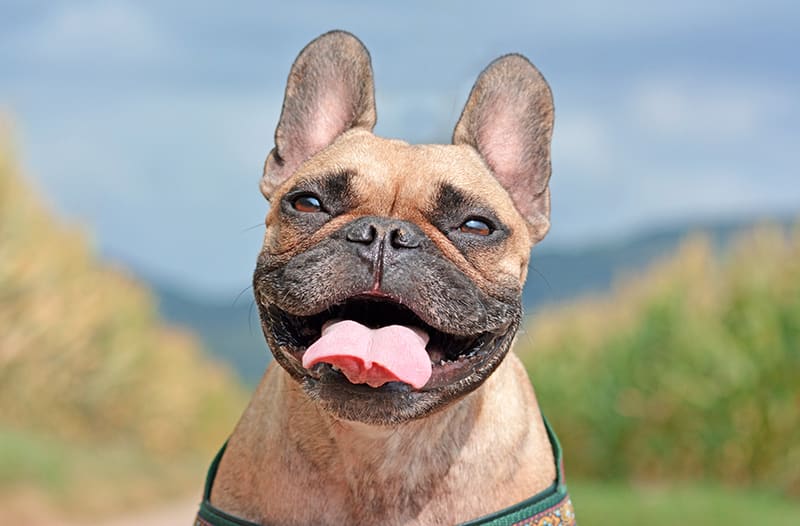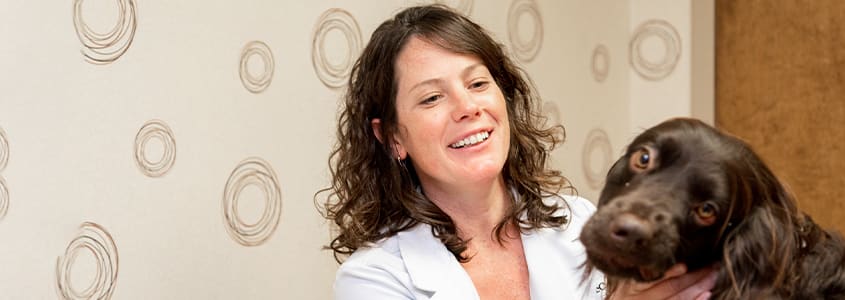Does it matter if my dog is on the heavy side?
If you think that your dog may be overweight, the very first thing you should do is to make an appointment with your vet. Carrying extra weight can be a sign of an underlying health issue, and can also be a major contributing factor to many health issues in dogs including joint pain and diabetes.
Your vet will weigh your dog, do a thorough physical examination to determine your pup's overall health, then let you know if your pet is overweight based on their build and breed.
How can I tell if my dog is overweight?
When it comes to your dog's health our vets recommend having any unexplained changes in weight checked out by your vet. Sudden changes in weight can indicate an underlying health issue. If aren't sure whether taking your dog to the vet is worth it, check out the points below to learn whether your dog may be overweight.
How energetic is your pooch?
- Reduced levels of energy and fitness are common in overweight dogs. This means that you may notice your pooch panting when walking, or walking slower than they should need to based on their age. You may even notice that your pup spends a lot of time sleeping.
Can you feel your dog's ribs?
- Provided that your dog isn't carrying extra weight you should be able to feel your pup's ribs without a thick layer of fat obscuring them. Your pet's ribs should feel somewhat like the back of your hand.
Can you see the tuck up?
- Looking from directly above your dog you should notice that your pup's chest is notably wider than their abdomen, and from the side you should be able to see a tuck-up from their chest to stomach.
Does your dog have a clear waistline?
- A dog that is overweight will generally have no real waistline and no distinction between their chest and stomach when viewed from the side or from above.
Which illustration looks most like your pooch?
- Below is an illustration showing dogs of different weight categories. Look over this overweight dog chart to get a visual understanding of what a dog should look like if they are a healthy weight, and what they might look like if they are overweight.

I think my dog is overweight, what should I do?
Unexplained weight gain can be a sign of serious illness, so if you think that your dog is overweight a trip to the vet is an important first step.
If your veterinarian determines that your canine companion is overweight and there are no underlying illnesses causing the weight gain, your vet will prescribe a diet and exercise plan to help get your pup's weight back on track.
Here are some things your vet may suggest to help your pup lose weight.
Regular Daily Exercise
- Follow a strict exercise schedule for your dog, including two walks every day and some daily outdoor playtime. Playing fetch or frisbee can help you and your pooch form a closer bond as well as provide your pet with a fun way to burn some extra calories.
Diet & Feeding Changes
- Your vet can quickly calculate the correct number of calories to feed your dog at each meal, and prescribe a low-calorie diet food for your pet if they feel it is necessary. Many vets recommend that dogs eat at the same time every day when following a weight loss plan, and pet parents should measure out the meal portions carefully based on their vet's recommendation or the amount stated on the food packaging for their dog's breed and ideal weight.
Routine Wellness Examinations
- Annual or twice-yearly wellness exams and regular preventive care give your vet the opportunity to examine your pooch for early signs of illness (before conditions become serious) and monitor your pet's weight and overall health.
If your canine companion is following a weight loss plan, see your vet for follow-up appointments so that your dog's progress can be monitored and dietary adjustments can be made if they are needed.
Note: The advice provided in this post is intended for informational purposes and does not constitute medical advice regarding pets. For an accurate diagnosis of your pet's condition, please make an appointment with your vet.
Is your four-legged friend carrying a few extra pounds? Book an appointment today for your dog. Our Greensboro vets can help you to get your pup's weight back on track.
Looking for a vet in Greensboro?
We're always accepting new patients, so contact our veterinary hospital today to book your pet's first appointment.
Related Articles View All
What happens during a routine pet exam?
Routine wellness exams are a proactive way to help safeguard your pet's long-term health and vitality. Why should you take your healthy pet to the vet? What happens during a pet health wellness exam? Find out.
How much does an emergency vet visit cost?
Emergency veterinary care can be costly, but planning ahead allows you to make decisions about your pet's care based on their needs rather than financial restrictions. Today, we look at the cost of emergency vet care, and how to be ready if your pet needs emergency treatment.
Kidney Failure in Dogs
Chronic and acute kidney failure are serious health problems commonly seen in dogs. Here, you will learn about the differences between chronic and acute kidney failure in dogs, the signs to watch for and how these conditions are treated.
Signs of Bladder Infections in Dogs & How They Are Treated
Many dogs suffer from bladder infections and other issues affecting the urinary tract system. What causes bladder infection in dogs? What signs should you watch for? How do vets treat bladder infections in dogs? Read on to find out.


